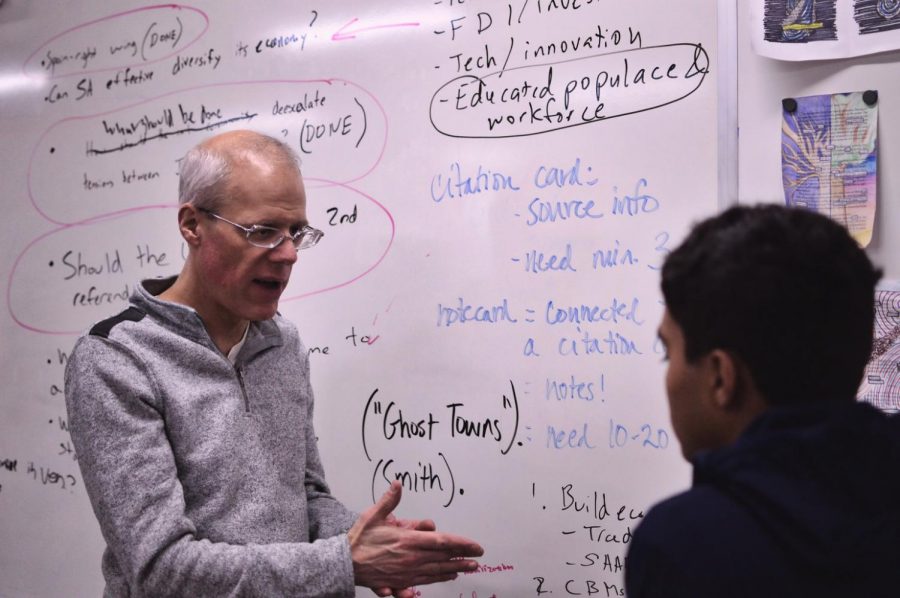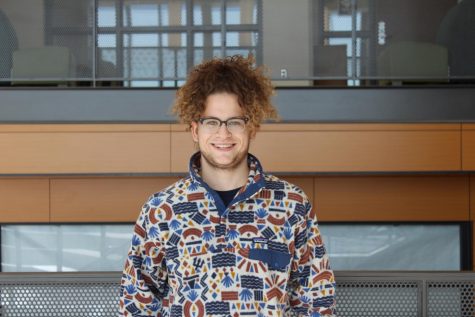Edina Speech Team ready to talk their way to a State Championship
Mentor to many: Joe Schmitt passes on his knowledge from years of extemporaneous speech.
April 5, 2019
Speaking has always had one purpose: to convey information between individuals. Whether that information is in the form of an argument or a drama, the speech team at Edina High School covers it all.
A key to the success of the speech team is the environment. “The atmosphere is very supportive and we’re all really fun to get along with,” junior Allie Russell said.
Most of the students do speech to become better at it, and they’re willing to help their fellow teammates. “When we’re not practicing speech, we’re joking around and helping each other improve our speech. Doing well is important to many people on the team, but we have the right balance of being serious and having fun,” sophomore Adam Soukup said.
The team is motivated to have a successful season, so when they pair it with an aspect of fun, it creates an enjoyable environment where students can feel supported while they improve their speeches.
The 2019 season marks the start of Hayden Uihlein as the new head coach of both speech and debate teams at Edina. With his new presence comes a more determined team. “We’ve actually got a new head coach this year, which I feel has been a lot better for the team because we’ve been more efficient… and more motivated to get stuff done, which is actually really nice to have,” Russell said.
The team is using this boost in efficiency to improve the experience of the members. “We’re trying to travel more and be more lenient on the workload because a lot of kids get stressed due to schoolwork, so we want to take other factors into consideration to make the activity even more enjoyable,” freshman Ananth Veluvali said.
The improvement all takes place at the practices, which happen on Mondays, Tuesdays, and Thursdays from 6:00 pm to 8:00 pm. “We show up and practice our speeches with our coaches and hone in on specific pieces to work on,” Veluvali said.
The speeches they work on are based on a few different categories; Soukup competes in one called creative expression. “Creative expression is all about making improvements to your writing, but when your piece revolves around already existing writing, you make changes in the story,” Soukup said.
There are other categories that compete in more of a debate-style competition, where participants have to research topics for their speech. For example, extemporaneous speaking is a competition that involves little preparation, but it is what Edina is best at. “[We’ll] hopefully get at least one person to go to nationals like we did last year. Tanner Jones was one of the ones who went to nationals last year for speech. He got second at nationals,” Russell said, who goes on to mention her personal goal was “to at least get to the final round of nationals qualification.”
Edina has had a national qualifier every year in the “extemp” category. When asked about what “extemp” speech entails, Veluvali explained, “You draw three questions from an envelope on political topics like, ‘Should the Fed raise rates?’ or ‘How should the international community response to the Rohingya crisis?’ After picking one of the three questions, you have thirty minutes to write and memorize a seven minute speech you deliver in front a judge, where you are then ranked comparatively to others,” Veluvali explained.
Over the course of the season, students who don’t compete in extemp make many changes to their speeches in order to improve them, but due to the fact that students in the extemporaneous category get their prompt 30 minutes before they deliver the speech, they don’t have that opportunity. They still, however, do a lot of preparation. Ananth Veluvali talked about his constant preparation. “You have to read extensively to do well in extemp speaking. As a general rule, it is an activity where what you put in is what you get out, and so you have to really work hard to do well,” Veluvali said.
His preparation involves a lot of time spent learning about current events. “I would say I spend a solid chunk of every day reading the news on what is happening here and abroad on topics (I will try to aim for 100-200 articles a week). In doing so, you’ll notice that the content of any speech you give can improve significantly given one’s vast and expensive background knowledge that can’t be gained in 30 minutes of preparation.”
His weekly reading has proven helpful, as he has been very successful this year. After taking fourth place in a difficult tournament, he qualified for the Tournament of Champions at Northwestern University. “The Tournament of Champions is a lot like what the name suggests: a very competitive national tournament where if you get a certain number of ‘bids’— something you gain if you place high enough (typically finals or semifinals) at a certain number of nationally recognized tournaments—you qualify to the TOC. The competition there is tough, but it seems like a fun experience with great judging and a welcoming community,” Veluvali said.
All in all, the team shows they enjoy seeing their peers succeed, so this should be one of the most successful seasons yet. “Getting to look at your teammate’s speeches and see them start from something that was just ok, and then really coming into their own and getting confidence with it, it’s absolutely amazing,” Soukup concluded.


